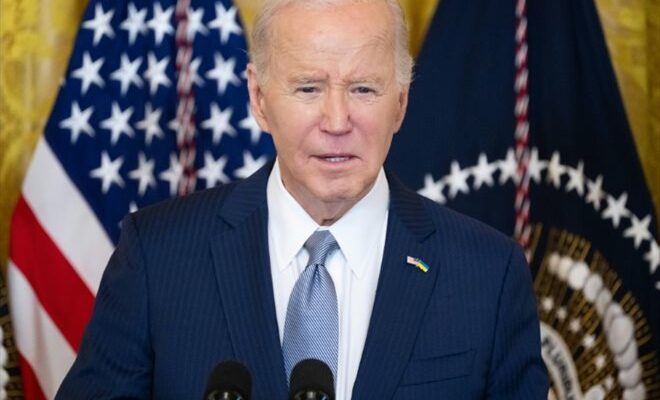The Director General of the World Trade Organization Ngozi Okonjo-Iweala gives a press conference on February 16, 2024 in Geneva, Switzerland (AFP/PIERRE ALBOUY)
The WTO opened its major ministerial conference in Abu Dhabi on Monday, the first since 2022, with a firm desire to look to the future, but without a clear prospect of results and in a climate of geopolitical tensions and disrupted global transport of goods. .
“It is now up to you to reach consensus on decisions aimed at building a better future for global trade,” launched the Director General of the World Trade Organization, Nigeria’s Ngozi Okonjo-Iweala, at the opening of the conference, attended by the crown prince of the United Arab Emirates.
“In a context of economic uncertainties and growing geopolitical tensions, we must collectively ensure that the WTO is able to meet today’s challenges,” added the Chair of the WTO General Council, Athaliah Lesiba Molokomme.
During its previous ministerial meeting two years ago, the WTO saw the rise of the desire to reform the WTO and agreements on fishing and patents for anti-Covid vaccines.
The WTO hopes for new agreements this week at its 13th Ministerial Conference, notably on fisheries and electronic commerce, but the negotiations promise to be laborious because decisions are taken by consensus and the differences are significant.
The Emirati Minister of State for Foreign Trade, Thani al-Zeyoudi, launched the opening ceremony, wishing that this conference would be “a launching pad for the future of world trade and for the reform of the WTO so that it is ready to meet current and future business challenges.”
“The environment we live in is changing rapidly and requires a new way of thinking. The increase in the number of WTO member (countries) and their diversity requires a dynamic approach from the WTO,” a- he added.
– “The miracle of 2022” –
Ms Okonjo-Iweala called on countries to replicate the “miracle” of the 2022 conference.
But “reproducing (this) success, miracle (…) will be a real challenge”, recently affirmed the European Commissioner for Trade Valdis Dombrovskis, warning that “negotiations on the most important points, fishing, agriculture and the moratorium on e-commerce, should be tightened until the last minute.
“Regarding the reform of dispute settlement, the discussions held in Geneva show progress, but it is not realistic to find common ground at this stage” on the question of the appellate body, he said. -he says.

General view of skyscrapers, January 24, 2022 in Abu Dhabi (AFP/Archives/Karim SAHIB)
However, countries hope that Abu Dhabi lays the foundations for reforming the WTO.
This ministerial is seen as the last opportunity to advance discussions on reform before a possible re-election of Donald Trump, who during his first term launched a trade war with China, blocked the organization’s ability to resolve trade disputes and threatened to leave her.
“This is the last chance. Postponing anything after the ministerial is not a good strategy,” assures a diplomatic source in Geneva.

US President Joe Biden speaks at the White House on February 23, 2024 in Washington (AFP/SAUL LOEB)
US Trade Representative (USTR) Katherine Tai recently “expressed the United States’ commitment to reforming the WTO and creating a more sustainable multilateral trading system that benefits all members.”
But according to Marcelo Olarreaga, professor at the Faculty of Economics and Management at the University of Geneva, “we cannot expect huge concessions from the United States in anything at the WTO. Biden administration cannot afford to make huge concessions.”
– “Fragmentation of the global economy” –
If negotiations on major subjects such as agriculture remain lively, small progress is expected in Abu Dhabi, particularly on aid to the poorest countries.
More than 120 countries, including China and the European Union, but not the United States, have for their part finalized a plurilateral agreement in Abu Dhabi to facilitate investments in developing countries.
The context of international tensions and concerns about the global economy, threatened according to the IMF by the Israel-Hamas war and attacks by Houthi rebels off the coast of Yemen, will weigh on the discussions.
“The current situation which is characterized by geopolitical tensions, high expectations of developing countries following the financial crisis and the Covid crisis and economic tensions due to inflation… all this combines to pose a risk of fragmentation of the global economy”, notes a European diplomat.
© 2024 AFP
Did you like this article ? Share it with your friends using the buttons below.




